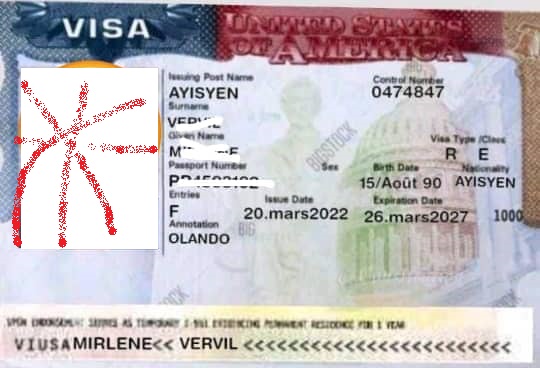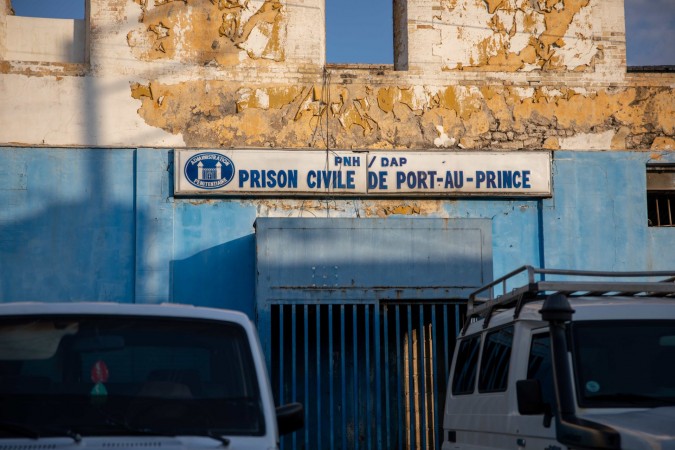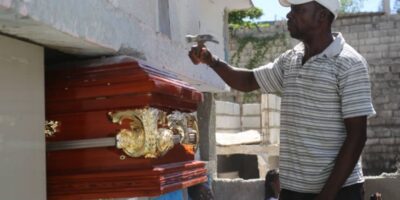« The national prison seems to be a gigantic hotel where the inmates have access to almost everything: smartphones, drugs, etc. »
Lire en Français : Des prisonniers du pénitencier national vendent de faux « visas américains »
When his sister came to him to ask him for $600 USD, for a chance to obtain a US visa, Joan immediately sensed that there was a catch. But he could not imagine the origin or depth of the fraud.
At the beginning of the year 2022, in March, Markendy Tristan sent a Facebook friend request to his sister, which she accepted. Facebook is her favorite social media platform. She enjoys spending time on Facebook and posting pictures all day. This new Facebook friend was eager to know her better. « He started texting her, says Joan, and she was texting back. Then very soon, the conversation took a turn. He started telling her that he loved her. »
The young single woman let herself be seduced by the man who told her that he lived in the United States. He had just lost his wife, who died of Covid-19, leaving him alone with a ten year old girl. He is looking for a woman who could help him raise his child, a second wife.
« Very quickly they left Facebook for WhatsApp where they held steady conversations. The man even requested to meet her parents to prove that he was serious and honest about his commitment. » Then, a few days following the first messages, the request arrived. « I found a way to help you come to the United States, Tristan explains. I know a pastor who is going on a mission trip to Haiti. He will return [to the US] with some members of the church. But you need to have a church membership card first. »
Read also : Barbecue a payé pour l’enterrement d’un journaliste assassiné
However, Markendy Tristan wanted to be certain that his future wife could handle herself on her own. She had to first collect $600 USD for the membership card and visa fees. She received the instructions on how and to whom to send the money. Once everything is settled, Tristan would then pay for the rest of the costs for the organization of the trip.
Excited, the young woman far from suspected that behind all of these love notes and hopes of marriage, was most likely a prisoner in the national penitentiary. Within the confines of this prison, where most of the inmates have cell phones, fake visas seem to be a lucrative business. It is impossible to know the number of victims who have been conned, from an initial message on social media.
Joan’s sister would’ve been another victim had Tristan not made a mistake. Or better yet, if Joan had not been so suspicious from the start. « The story seemed weird. I have an international number, so I decided to call the number with whom my sister had been communicating. When he picked up the phone, there was a lot of noise, and I heard people speaking Creole. I spoke English, and was met with silence on the other end, » explains the young photographer.
He had just told my sister that he went to the supermarket. « I asked my sister to make a video call. He declined the call each time. My sister told me that they used to have video calls, but she could never see his face because he was always in the dark.
Another thing caught Joan’s attention: “He has over 2,000 friends on Facebook and I found not one man on the list » he said.
Read also : Le sexe sans protection augmente les infectés du VIH dans les prisons haïtiennes
Faced with this evidence the young woman understood that she had almost been swindled. She cut off all communication. Swiftly, Tristan blocked her on all of the social media networks where they used to chat.
Later on, a family member, who is detained at the national penitentiary explained how widespread this practice is in the prison. In a voice note he sent to them, he affirmed how easy it was to handle such a scam in the prison. At the time, he was not yet aware that Joan’s sister had been approached in this way by an account going by « Markendy Tristan ».
“It only takes knowing how to sweet-talk, said this prisoner. We are really caring. We can give affection. In fact, we are in a prison where we have nothing better to do. Once the person trusts you, they will do whatever you ask them to do. »

A crude replica of a visa, riddled with errors, is affixed to the travel document
According to Joan, this prisoner himself confessed to them that he was currently luring a policewoman using the very same US visa scam. The chosen victims send their passports and money to an external accomplice. Then a crude replica of a visa, full of mistakes, is affixed to the travel document.
According to the prisoner who sent the voice note, the money is sometimes used to cover lawyer fees or simply to obtain goods within the prison. And there is no shortage of goods: the national prison is a « veritable marketplace, » according to an investigator who works for a locally based human rights organization. He has regular access to the prison.
« I haven’t heard about the visa yet, this source admits. But there is a lot of traffic in the prison. They get provisions from the outside, and during the searches some items get through. Sometimes, too, there are some that seemed not to get searched at all. » This trade takes place between the outside and the prison, but also within the prison center itself. « You can find everything there, you just have to ask the prison chief, who knows who has what. Connections are made during breaks. »
Yves Garçon spent 90 days in jail after a bloody street fight. Even in 2006, when you entered the national prison, you needed money. « You have to buy yourself a kind of bed, he said, otherwise you would sleep directly on the floor, without any sheets. If a parent gave you sheets it could get stolen from you. Better to buy it on the inside. In the prison, either you buy or you sell. »
Some prisoners make a reputation for themselves as salesmen, and police officers get involved too. « I bought a pair of Jordans, said Garçon. It’s funny, I got out of jail with more clothes than I had before. »
Since the food offered by the prison is to be avoided at all costs, as it is deemed vile, the money sent to the prisoners is also used for this purpose. But according to the source working in the human rights organization, the transfers are sometimes staggering. “Prisoners can receive up to 2,500 gourdes, he said. This is not really allowed but tolerated because it was necessary to facilitate access to food or to buy medicine on the outside. However, we also saw transfer receipts from $3,000 to $10,000 USD.”

The Port-au-Prince prison is like a mini Wall Street because money is everywhere. Ana is a policewoman working in the prison. She asked to remain anonymous to avoid repercussions at work.
According to Ana, despite all of its problems, the national prison is one of the safest prisons in the country. There are four watchtowers to respond quickly during riots. However, the danger is not only from the prisoners but also from the coworkers. « Some prisoners are more comfortable than the prison director. They have money, and they move it around. An officer who has no self-respect can be corrupted. »
For another officer of Épines, the country’s prison response unit, who did not wish reveal their name, the prison environment is risky for officers. « The officers working inside the prison have to be smart and hope for divine intervention. When there is a cell count, they go in twos, unarmed. They are two facing a cell of hundreds of prisoners. And we do not necessarily trust the colleague with whom we are paired with. »
Finally, read : Les prisons en Haïti sont horribles. Pour les femmes, c’est l’enfer.
The national prison is the largest prison center in Haiti, but it is not the only one in this situation. Trading has become an almost normalized activity in other prisons too. In February 2022, The Je Klere Foundation published a report to protest the conditions at the Croix-des-Bouquets prison. The agents assigned to the center abandon it. The prisoners, on their own accord, organize themselves. Some prisoners sell the prison food to their cellmates for 200 gourdes. There is also a price for drinking water: up 500 gourdes per gallon. The NGO sounded the alarm, which could have been the same for other prison centers.
According to a report by the United Nations Integrated Office in Haiti dated June 2021, as of May 31, 2021, 10,801 men, 436 women, 240 boys, and 23 girls were in custody in the different penitentiary centers prison in Haiti.
The photos (except the fake visa) are by Carvens Adelson for AyiboPost
English translation by Didenique Jocelyn.







Comments